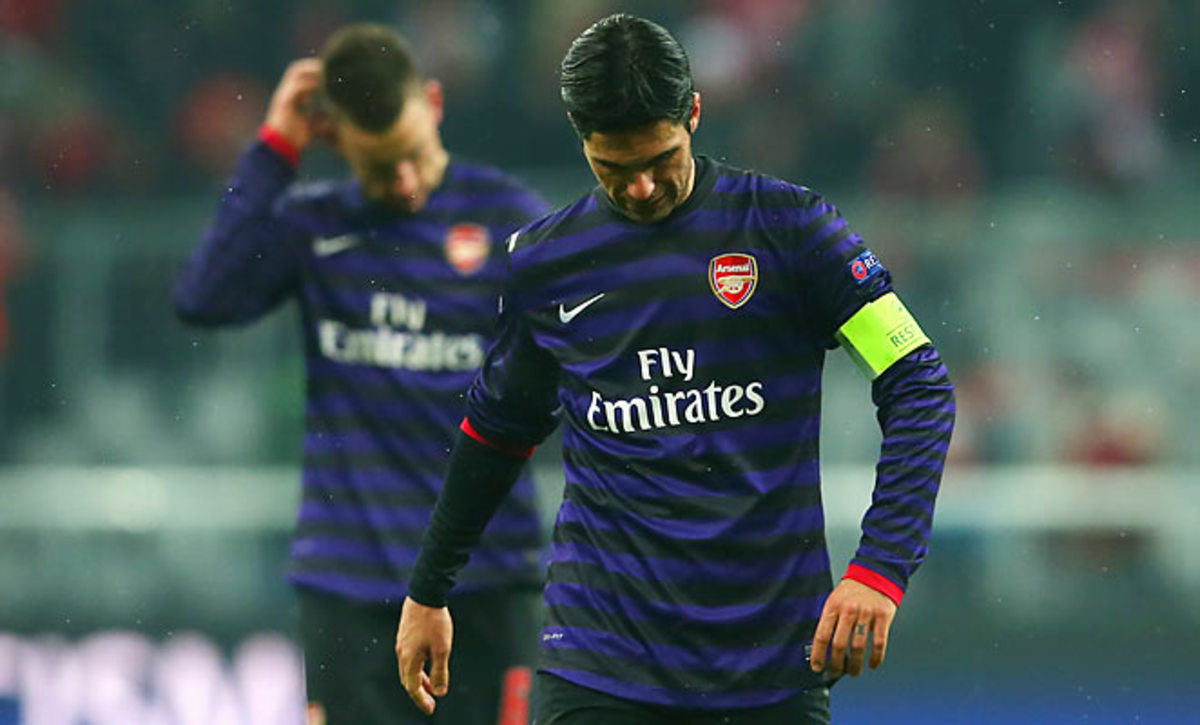
Arsenal's loss the latest setback in EPL's steady decline

Mikel Arteta and Arsenal are out of the Champions League despite winning 2-0 at Bayern Munich.
Alexander Hassenstein/Bongarts/Getty Images
It was, in the end, heroic failure for Arsenal, undone only on the away goals rule -- but failure it was. Bayern Munich was surprisingly sloppy -- perhaps precisely because the first leg was so simple for the club -- but Arsenal regained a significant amount of self esteem with its performance in a valiant 2-0 win that wasn't quite enough. And so, for the first time since 1996, there is no Premier League team in the quarterfinals of the Champions League.
This is, of course, a blow to the self esteem of the Premier League but it is not, for all the handwringing and gnashing of teeth, the end of the world. Blips happen. The better team doesn't always win. Seven of the last nine Champions League finals have featured Premier League sides, and one of them had two. Eight different sides have contested the last nine Champions League finals: four of them have been from the Premier League. Even the defending champion is from the Premier League.
The Premier League began last season at the top of UEFA's coefficient tables. They have since fallen six points behind Spain but are still three ahead of Germany. Given Bayern Munich and Borussia Dortmund are still in the Champions League, it's possible Germany could close the gap further, although there are still three English sides in the Europa League while Stuttgart seems sure to be eliminated by Lazio tomorrow evening. In a sense, though, that is cosmetic, for each of the top three countries in the chart are awarded four places in the Champions League and the gap from Germany to Italy in fourth is over 13.
LOWE: Barcelona's David Villa seizes opportunity
Besides that, there are specific reasons for the Premier League's underachievement over the past two seasons. Manchester United was unusually sloppy last year, but this season was unfortunate to draw Real Madrid and then to have Nani sent off when it led in the tie. Manchester City, without any recent European history, has been seeded low in each of the last two seasons and has suffered with a tough draw on each occasion (and then played pretty badly -- a kinder draw might not have punished those poor performances quite as severely). Arsenal and Chelsea have problems of transition that undermine them in all competitions -- and Chelsea, though they are the defending European champions, only finished sixth in the Premier League last season.
Chelsea's success in the Champions League last season, of course, was not a direct validation of the Premier League. After the first leg of 2012's round of 16, it trailed 3-1 to Napoli while Arsenal, the only other remaining Premier League side, was 4-0 down to AC Milan. The Premier League came within 15 minutes of having no representatives in the quarterfinals last year, and that hints at long-term issues that can't be disguised by Chelsea's heroic defending in the semifinal and the final. But the year before that, the Premier League had three quarterfinalists. The year before that it had two. And in each of the three seasons before that, three of the semifinalists were from the Premier League.
Video: Messi's goals against AC Milan
The sample size is (necessarily) small, and we should be wary of drawing too many conclusions from those figures but the trend is of a slow decline from a position of great strength. That decline, intriguingly, began in the summer of 2009, which was when Xabi Alonso left Liverpool, pointing out that the fall in the value of the pound and the new 50 percent tax rate for top earners (since abolished) effectively meant his salary was worth a third less than it had been when he'd signed his contract. When he'd signed the pound had traded at 1.48 Euros, by then it was down to 1.18.
Economics, clearly, play a major part in where the balance of power lies in European football. It's no coincidence that the rise of the Bundesliga has come along with the reemergence of Germany as an economic power while the Eurozone crisis thrashes around it. That renewed financial power is demonstrated by the fact that, thanks to sponsorship deals with the likes of Deutsche Telecom, Adidas, Paulaner Brewery, Audi, Coca-Cola, Samsung, Siemens, Burger King, Continental and Sheraton, Bayern Munich's commercial revenue last year amounted to £201.6m, the highest of any club in the world.
Given the pound has now fallen to 1.15 against the Euro, there's little reason for optimism there, but there are other economic factors working in the Premier League's favor. One is that, however bad Britain's economy, almost everywhere else in western Europe is even worse (aside from Germany). There's even talk that Real Madrid and Barcelona may have to start reducing their debts and paying their tax bills in full. The other positive is the enormous new TV deal just signed by the Premier League clubs: it's worth a little over £1 billion per year for the next three seasons, a 71 percent increase on the existing deal. Even if some of that revenue is used on reducing debt, that still gives Premier League clubs immense spending power.
In theory, that should increase the number of top players moving to England, enhancing the strength of the Premier League. There has been a downturn but the long-term prognosis for the Premier League remains extremely good.
CREDITOR: Another U.S. striker lights up Europe




